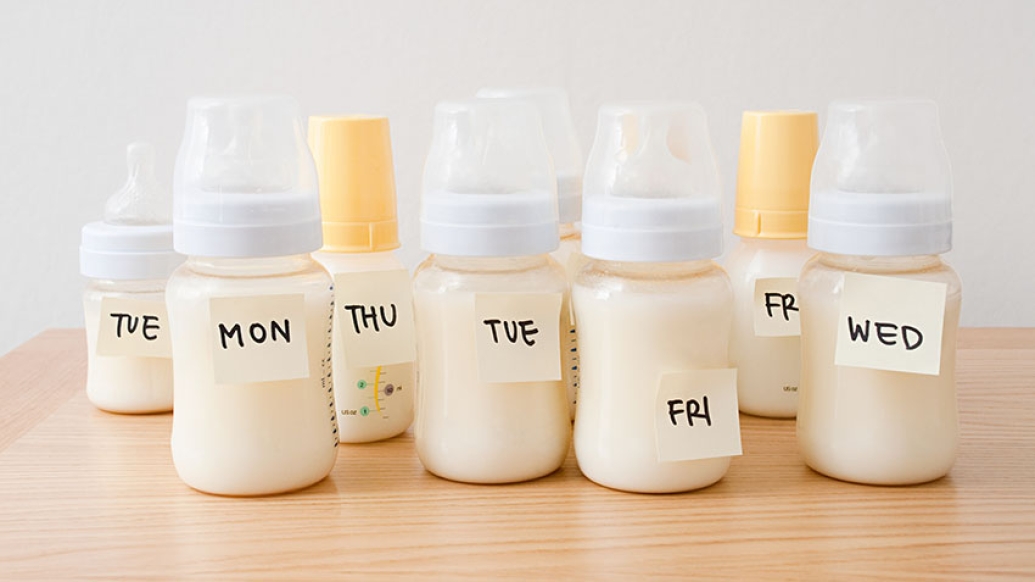From the 5:5:5 rule and beyond, a Michigan Medicine expert breaks down guidelines to safely store, thaw and heat breast milk or formula.
9:30 AM
Author |

This article was part of a short, month long Michigan Medicine Health blog series called #MommyMonday. From moms and dads to anyone who cares for an infant, check out other posts from this series like what to know about mastitis, common breastfeeding positions to improve latching, and what one patient's personal breastfeeding experience taught her.
Whether you're returning to work, often separated from your little one, or have decided to use formula, it's important to know best practices for storing breast milk, formula, or a combination of the two.
"It's essential to store and use them correctly in order to avoid contamination or spoilage," says Carrie Pawlowski, RN, a lactation consultant at Michigan Medicine.
LISTEN UP: Add the new Michigan Medicine News Break to your Alexa-enabled device, or subscribe to our daily updates on iTunes, Google Play and Stitcher.
But Pawlowski also notes it can be overwhelming at times for moms to remember all of the guidelines. "Storing milk might seem simple enough, but when you're functioning on little to no sleep, it's the last thing you want to search the internet for at 3 a.m."
So how long can breast milk sit in the fridge for? How do you safely thaw and prepare breast milk after it's been frozen? For more on those rules and others, read below for Pawlowski's recommendations.
So you left the bottle on the counter..
Meet every new mom. But before discarding the golden milk, Pawlowski says breast milk can safely be left out and used for up to 6 to 8 hours at room temperature, at up to 77 degrees. However, formula, or a mix of breast milk and formula, should be limited to an hour.
Keep in mind, though, the rules aren't the same across the board: if your infant was born prematurely or hospitalized, you should completely avoid leaving milk or formula out on the counter, she says.
According to Pawlowski, it's safest to refrigerate milk right away. If you can't, try and keep the container cool by covering it with a cold towel.
WATCH: How long should you breastfeed for?
Refrigerating and transporting
When storing baby milk in the refrigerator, always keep the temperature at 39 degrees and place bottles in the back to keep them as cold as possible. A healthy, full-term baby should use refrigerated milk within five days, while premature or hospitalized infants should consume bottles within 48 hours.
Pawlowski also says it's important to distinguish which bottles are breast milk, formula or a combination of the two since "after breast milk and formula have been mixed or formula is opened, the bottle is only good for approximately 24 hours."
And any milk and formula mixture should follow the same rules as formula.
To easily remember when a bottle was prepared, Pawlowski suggests adding a sticky note or label to it with the date and time that the bottle was made.
Something I recommend to moms is the 5-5-5 rule. Try and use milk within five hours at room temperature, five days in the fridge, and by five months in the freezer.Carrie Pawlowski, RN, lactation consultant at Michigan Medicine
If you're transporting milk or formula in a cooler, both are safe to provide your infant within 24 hours as long as the temperature was kept between 5-39 degrees.
"Make sure to use ice packs if you're transporting milk or formula to keep it as cool as possible," says Pawlowski. "And keep the cooler closed when you don't need to be in it."
Freezing
"Although milk can still be good if it's stored longer than what we recommend, not all milk will behave the same," says Pawlowski. "Also, fat in milk can affect the quality and taste as time goes on."
If you're storing breast milk within a fridge's freezer compartment, make sure the area is kept at 5 degrees and use it within two weeks after it's been thawed. This rule applies to all infants.
If using a freezer with a separate door, milk should be stored at 0 degrees and make sure to store it in the back of the freezer where the temperature is the most consistent. For healthy, full-term babies, this milk can be used within three to six months. But for premature or hospitalized infants, the time is cut down to two to three.
When using a chest or an upright, deep freezer, make sure the temperature is set to -4 degrees. For a healthy, full-term baby, breast milk can be good for up to six to 12 months. However, for premature or hospitalized infants, use that milk within three months.
WATCH: How do you stop breastfeeding?
Thawing
To gradually thaw breast milk, transfer the container to the fridge or place the bottle in warm water, and make sure it's used within one hour if warmed to room temperature.
MORE FROM MICHIGAN: Sign up for our weekly newsletter
But never, under any circumstance, use a microwave to warm or thaw breast milk or formula, warns Pawlowski.
"Not only does it result in uneven heating, but it can easily damage the milk or worse, harm your infant."
After warming up the milk, Pawlowski recommends gently swirling the bottle before feeding it to your little one.
Once completely thawed, milk should be used within 24 hours. Any unused milk shouldn't be used for another feeding or refrozen after being thawed, Pawlowski states.
"One question I often get is whether or not you can add fresh breast milk to milk that's been in the fridge or freezer," says Pawlowski. "As long as the new milk is chilled completely in the refrigerator before the two are added together, then it's OK."
When in doubt
Does breast milk really go bad? Pawlowski says it can. When it smells like spoiled milk, toss it. "Be comfortable taste testing your own milk – doesn't taste right? Don't give it to your infant."
She also recommends the 5:5:5 rule, which can be a quick lifesaver for moms to reference.
"Something I recommend to moms is the 5-5-5 rule," Pawlowski says. "Try and use milk within five hours at room temperature, five days if in the refrigerator, and five months if in the freezer."
Looking for another way to remember all the tips above? Check out the breast milk and formula infographics below and save them to your phone for future use!
These guidelines were created with references to information from Academy of Breastfeeding Medicine (2004) and Center for Disease Control (2010).

Explore a variety of health care news & stories by visiting the Health Lab home page for more articles.

Department of Communication at Michigan Medicine
Want top health & research news weekly? Sign up for Health Lab’s newsletters today!








